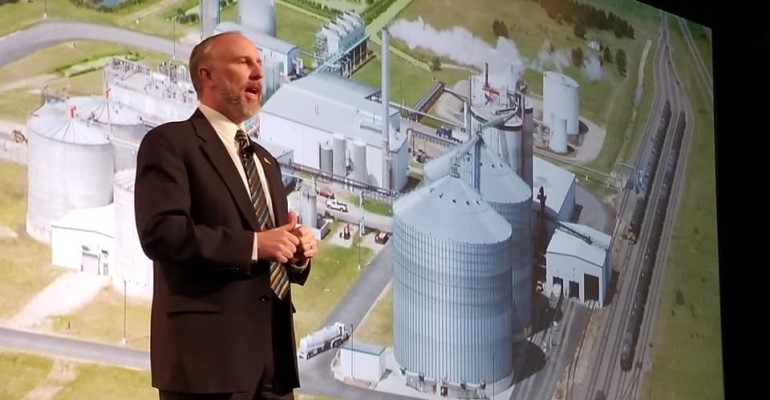Ups and downs not over for ethanol industry
RFA and IRFA executives offer predictions for new decade, including that ongoing RFS battle will intensify.
January 17, 2020

In 2019, ethanol producers saw their share of challenges, but the industry remains focused on moving forward and working cooperatively with the Environmental Protection Agency in 2020.
“What made 2019 such an especially frustrating year is that our policy and regulatory wins were often overshadowed by new obstacles and unexpected setbacks,” Renewable Fuels Assn. (RFA) president and chief executive officer Geoff Cooper said while keynoting the Iowa Renewable Fuels Summit on Jan. 16.
“At every turn, it seemed our hard-fought victories were eclipsed by new impediments and a general sense of malaise and cynicism in the marketplace,” Cooper added.
The industry had many policy successes, from approval of year-round use of E15 and the President's visit to an Iowa ethanol plant to EPA finally including measures to reallocate Renewable Fuel Standard (RFS) blending volumes lost to small refinery exemptions (SREs). Despite these victories, he said, the “promise of new demand evaporated when trade wars crimped export opportunities and EPA doled out dozens of secret refinery waivers.”
An EPA rule finalized on Dec. 19, 2019, ignited frustration throughout the agriculture and biofuel communities because, instead of accounting for demand destruction caused by SREs in future RFS rulings by using an average of the number of previously granted SREs, thus providing market certainty, the rule stated that EPA will account for SREs using an average of U.S. Department of Energy recommendations, leaving the integrity of the RFS up to EPA’s discretion.
“Yes, the biofuels and ag community were frustrated on Dec. 19, but that frustration has slowly evolved into focus on the work to be done in 2020,” Iowa Renewable Fuels Assn. (IRFA) executive director Monte Shaw said. “I think that starts by trying to rebuild some type of working relationship with the EPA. Speaking for myself, I’m ready to try. I want to try to work with EPA to take steps, small and large, that can rebuild some trust. I think the question here is: Does EPA want to do that?”
In his speech at the Iowa summit, Shaw emphasized that, despite this disappointment, there were many other policy victories in 2019 that the biofuel industry can use to grow years into the future.
“My view of 2019 is no longer solely colored by the frustration of Dec. 19,” he said. “While it is certainly a headline, it is not the entire story. As I consider 2019 from a policy perspective, there were many more significant victories than defeats, and while admittedly not a quick fix to our current economic challenges, I enter 2020 with the feeling that future economic gains will be one day traced back to 2019.”
Shaw cited year-round E15 use, a five-year extension of the biodiesel tax credit and progress in various trade markets among his list of 2019 victories. He also emphasized that while the Dec. 19 EPA rule didn’t create the immediate market certainty the industry fought for, it did create a path forward.
“If the Trump Administration follows through, then 2020 will be the first year where the RFS was fully implemented at the statutory levels since 2013,” Shaw said. “It’s hard to believe, but every year from 2014 to 2019, the congressionally mandated RFS levels have been undermined by either illegal general waivers under the Obama Administration or abuse of refinery exemptions under the Trump Administration. There has not yet been a year when the 15 billion gal. RFS was truly implemented at 15 billion gal.”
Shaw concluded by outlining top priorities for 2020 for the industry to stay focused on, including encouraging EPA to follow through on its promise to follow DOE recommendations and make the RFS whole, addressing a court-ordered remand of 500 million gal. of ethanol waived from the RFS illegally and pushing for new trade opportunities with Mexico and China.
Cooper also offered four predictions for the new decade. First and foremost is that the battle over the RFS will not only continue but intensify. “We know refiners are already working to recast the post-2022 RFS into something that limits the use of ethanol and other biofuels and fails to drive further growth,” he said. “We can’t let that happen. That’s why we are redoubling our efforts to ensure the RFS remains intact as the transformative and growth-oriented program Congress intended it to be in 2023 and well beyond.”
Cooper also predicted that low-carbon fuel standards will spread, that U.S. ethanol exports will resume vigorous growth due to thawing trade wars and that — at some point in this decade — E15 will become the standard gasoline blend in the U.S.
Regarding the last of these, Cooper reminded his audience of the history of E10. “Twenty-five years after its commercial introduction, E10 still only accounted for about 20% of total U.S. gasoline sales, but in just seven years — between 2003 and 2010 — E10 saw hockey-stick growth and went from about 20% of the market to almost 100% of the market,” he said.
Shaw concluded that “2019 was not a fun year, but policy seeds were planted that could grow into meaningful opportunities for biofuels producers and farmers in 2020. The task before us is to work with the Trump Administration to make this happen. I am ready and willing if they are. Twenty-twenty can return hope and financial stability to rural America. We stand here today urging the Trump Administration to take the steps necessary to harvest the possibilities.”
Closing his speech with a note of optimism, Cooper added a fifth prediction stemming from his prior ones: “Ethanol’s best and brightest days are ahead of us!”
You May Also Like


